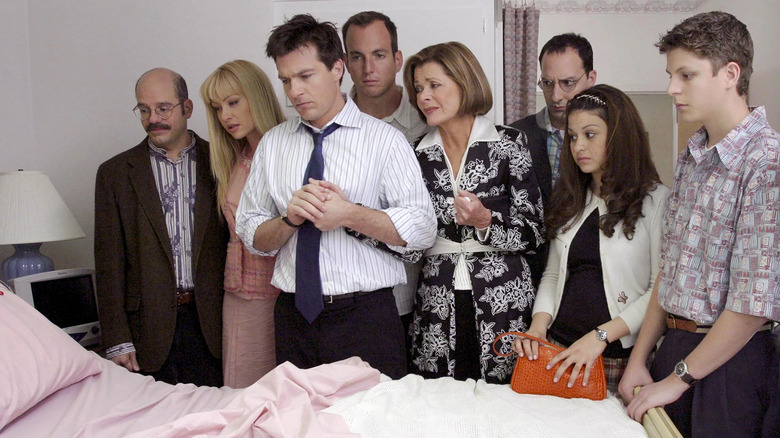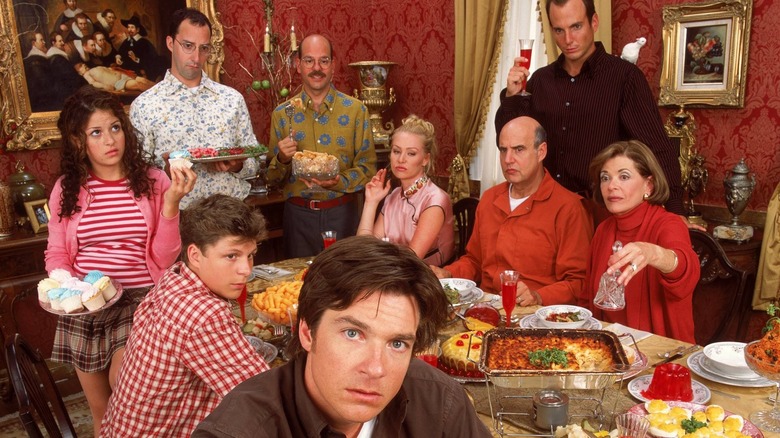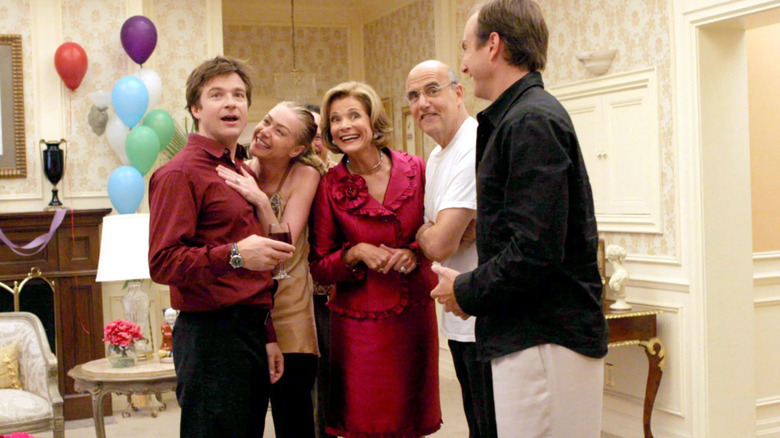Why Arrested Development Ended When It Did
"Say goodbye to these!" "Arrested Development" was canceled by Fox back in 2006, leaving its small but dedicated fanbase crushed. Now viewed as one of the defining sitcoms of the early aughts, its brilliant title refers to perhaps the most hilariously dysfunctional family on television, the Bluths, as they attempt to adjust to their new, significantly less wealthy circumstances. It always falls to Michael (Jason Bateman), the only Bluth who actually kind of has it together, to hold his family together.
The series ran for a mere three seasons beginning in 2003, with each season having fewer episodes than the one preceding it. For those watching at the time, it seemed like a matter of when the show would get the ax, rather than if. "Arrested Development" is hardly the only show to be canceled far too quickly by Fox, who didn't even give "Firefly" a full season before dropping the ax. However, "Arrested Development" was resurrected by Netflix in 2013 for what I still think is an underrated fourth season, which was followed by a fifth and final one in 2018 that went over about as well as the Cornballer.
There are several factors that contributed to the show being canceled. While it may have run out of steam by the time the cast reunited, it's hard not to wonder what could've been if "Arrested Development" had gotten a few more seasons in its initial run, especially in light of how great season 3 is. Let's take a look at exactly what led to the show's premature cancellation.
It's showtime!
Critics adored "Arrested Development," which won five of seven Emmy nominations for its freshman outing. However, the show's low ratings would indicate that they were pretty much the only ones watching. As Fox continued to lose faith in the series, the network lessened the episode order with each season, going from the then-standard 22 to 18 — a move which was mocked by the show — and finally 13. According to the New York Times (via Looper), Fox shuffled the series around quite a bit, at one point trading Thursday night for Sunday night and pairing it with "The Simpsons" for summer reruns in the hopes of attracting new viewers. Of course, summertime is probably when people watch TV the least, so it didn't do much to change the show's circumstances.
Season 3 saw "Arrested Development" move again, this time to Monday evenings. Changing the show's airtime repeatedly obviously made it more difficult for viewers to find the series, and even more damning, Fox chose not to air it during November sweeps. The writers even made meta jokes about the show's cancellation at the time, such as in season 3 episode "S.O.B.s" when the Bluths threw a fundraiser in the hopes of saving the company, and this hilarious exchange happened:
George: "I don't think the Home Builders Organization is going to be supporting us."
Michael: "Yeah, the HBO's not going to want us."
George: "Well, I think it's showtime."
Fans who had been following the show's progress knew "Arrested Development" was already done for, unless ... the show could get picked up by another network, like Showtime or HBO. Sadly, this did not come to pass and in one final blow to the series, Fox aired its last four episodes opposite the Winter Olympics, which were on NBC. Showtime really was interested in picking up the show, but series creator Mitchell Hurwitz passed on the offer.
'I've made a huge mistake'
As is the case with many shows canceled in their prime, quite a bit of the blame lies with the network. Sometime during season 2, David Cross (Never-Nude Tobias Fünke) went on something of a rant about Fox's marketing strategy for "Arrested Development," or lack thereof, and he wasn't wrong. It's clear that the network had no idea how to advertise for the series. After all, the show eschewed a typical sitcom formula, which made it more difficult to just tune in for an episode here and there. "Arrested Development" rewarded those who stuck around with hysterical long-running gags and multiple plot points tying into previous episodes. The main issue was just that no one was watching, which perhaps Fox could've remedied if they'd made a stronger effort trying to find it an audience.
According to Ad Savvy, much of the issue could be attributed to Fox's Luddite attitude. Like many networks, it paid far too much attention to Nielsen ratings, which were already growing obsolete thanks to DVRs. There was also a lot of online support for "Arrested Development" which the network completely failed to embrace. Aside from that, there were very few commercials running for the show during any given season and the ones that did weren't at all indicative of the type of series it was. "Arrested Development" was nothing like the rest of Fox's lineup, so those same marketing techniques were never going to work.
Fans were so excited when Netflix finally brought "Arrested Development" back from the dead, but it wasn't exactly smooth sailing for the actors. Cross said on The Daily Beast's "The Last Laugh" podcast (via IndieWire) that the show is done for good now, and while "there's always money in the banana stand," I think even the most ardent fans could agree that it's probably for the best at this point. There are some aspects of the Netflix run that deserve appreciation, but ultimately the series just wasn't able to recapture its former glory. Still, those initial three seasons will never lose their magic and the show has already cemented itself as one of the greatest comedies of all time.


